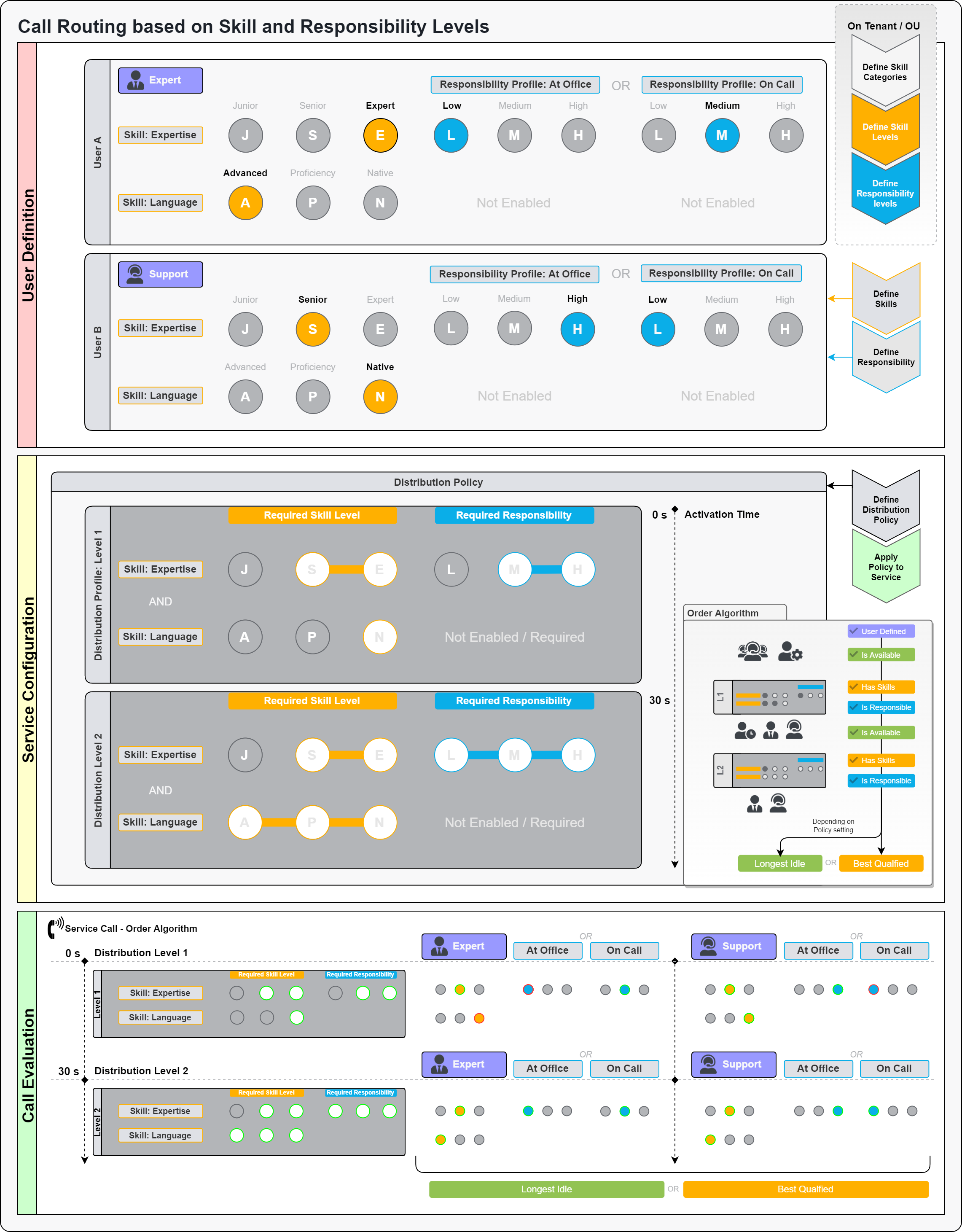Below you will find mostly concept information about the Nimbus call distribution order algorithm. It defines how Nimbus users are pooled and selected for call distribution, based on availability, skills, and responsibility.
🔍 If you need specific hands-on instructions on how to set up your own Contact Center via the Nimbus admin UI, refer to the related Use Case - Setting up a Contact Center.
💡 Click on the tabs learn more.
INC Distribution order accordions

Skills/Responsibilities
✅ The first step before using skill and responsibility based-routing should always be a look at your organizational structure. Ask the question: what kind of expertise is important when handling incoming calls? How should our users (agents) be categorized accordingly? Then go ahead and do the following:
- Define skill categories ,such as "Language Skills" or "Product Expertise". You may also define soft skills or adjectives without levels such as "First-Responder".
- Optionally define skill levels according to your chosen category. This allows for escalation levels so that you can require certain skills or widen the user pool by gradually lowering skill requirements of long-waiting calls.
- Optionally define responsibilities to apply to any category of skills. Responsibility levels can be used to distinguish skill importance, e.g. based on on time of day, workload, out-of-office status, or for high-demand situations where users with certain skills are more responsible than others.
- Optionally define responsibility profiles for your users to select from. A profile automatically groups skills and responsibility levels together and lets you define corresponding levels for each profile and user.
➕ In our example, we defined two skill categories with levels. Responsibility is enabled for the "Expertise" skill which will be explained further below.
🔍 Information on this configuration can be found in Skills and Responsibilities.
💡 We recommend you to coordinate this with your (future) service team owners and their respective Organization Units in order to avoid unnecessary duplicates of skills, categories, and profiles within your Nimbus tenant.
User Definition
✅ After setting all your skills and responsibilities, you want to define your individual Contact Center users (agents).
- Optionally assign the additional responsibility profiles for each user where needed. By default, each user has two system profiles: Duty (which considers all skills) and Off Duty. Users will be able to select further responsibility profiles you defined from the Nimbus frontend (based on their respective Organization Units).
- Define skill and responsibility levels for each user. With further profiles, you can define these levels individually for each user.
➕ In our example, we defined two users with varying levels of skill and expertise. A highly skilled user (e.g. a programming expert) may be busy with other tasks during the day, but shall answer questions while being "On Call" at weekends.
💡 Usually you do not change skills on users very often, as they remain consistent. Skill-based responsibility, however, may be different for each user depending on their selected profile. Make sure that the naming and meaning of your profiles is clear and understandable for your users (examples could be: “Night Shift”, "Weekend Duty", "High Load").
Service Configuration
✅ After defining your agents, it's time to apply policies to your services. These policies define how agents are pooled and selected during an incoming call.
Rules for the selection order algorithm
In order to be selected, defined Nimbus Contact Center users must fullfill all the required criteria. These are as follows:
- Users must have all required skills.
- (Of the required skills) one skill level must match for the user to be selectable.
- (When responsibility is enabled for a skill), one of the required responsibility levels must match as well.
- The user must be available (e.g. not in RONA state, or Busy in another call)
-
If multiple available users match the requirements above, the order algorithm defines the priority as follows:
- Best Qualified: Prefers highest skill qualification (even if higher respond time)
- Longest Idle: Prefers longest idle team over both responsibility and skill level.
-
Define a distribution policy with a clear name (e.g. Regular day service policy) and an order algorithm (see info above).
- Define the distribution levels with one or more profiles of escalation.
- Each profile determines the required skills AND their required responsibility range.
- Assign the policy within your Service Settings so that it takes effect immediately on the next call.
➕ In our example, we defined a policy with two levels, both excluding the "Junior" expertise level, but lowering the responsibility and language requirements on the 2nd level at the 30 second mark.
Call Evaluation
✅ Once assigned to your Contact Center service, the call will be distributed according to the order algorithm.
- All skill-defined users are pooled. Users must be available (not in other calls, not busy in meetings, etc.)
- The rules of selection are applied (MUST have all skills, MUST be in any allowed responsibility level)
- On equal match, the users are selected based on the order algorithm setting (Longest Idle, Best Qualified)
➕ In our example, we explain the algorithm via the two levels defined in our distribution profile earlier:
| Level | Selection Criteria |
|---|---|
| 1 |
|
| 2 |
|